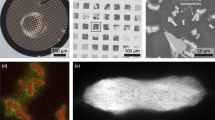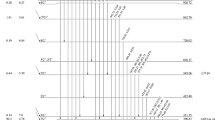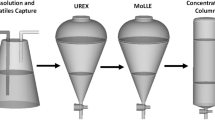Abstract
THE preparation of adequate sources is one of the most critical problems in β-ray spectroscopy. In general, chemical means alone have not proved sufficient. Crystal formation and the tendency for a non-uniform distribution of the source material make the effective thickness of the source considerable, even in cases where the amount of material is small enough to make the average thickness negligible. In addition, it is often difficult to concentrate the activity on a sufficiently small area of the supporting foil. For these reasons, use has been made of evaporation in vacuo, of electrolysis, and of isotope separators.
This is a preview of subscription content, access via your institution
Access options
Subscribe to this journal
Receive 51 print issues and online access
$199.00 per year
only $3.90 per issue
Buy this article
- Purchase on Springer Link
- Instant access to full article PDF
Prices may be subject to local taxes which are calculated during checkout
Similar content being viewed by others
Author information
Authors and Affiliations
Rights and permissions
About this article
Cite this article
BJØRNHOLM, S., NIELSEN, O. & SHELINE, R. A Microchemical Method for the Preparation of Sources of Actinium and Europium for β-Ray Spectroscopy. Nature 178, 1110–1111 (1956). https://doi.org/10.1038/1781110a0
Issue Date:
DOI: https://doi.org/10.1038/1781110a0
Comments
By submitting a comment you agree to abide by our Terms and Community Guidelines. If you find something abusive or that does not comply with our terms or guidelines please flag it as inappropriate.



